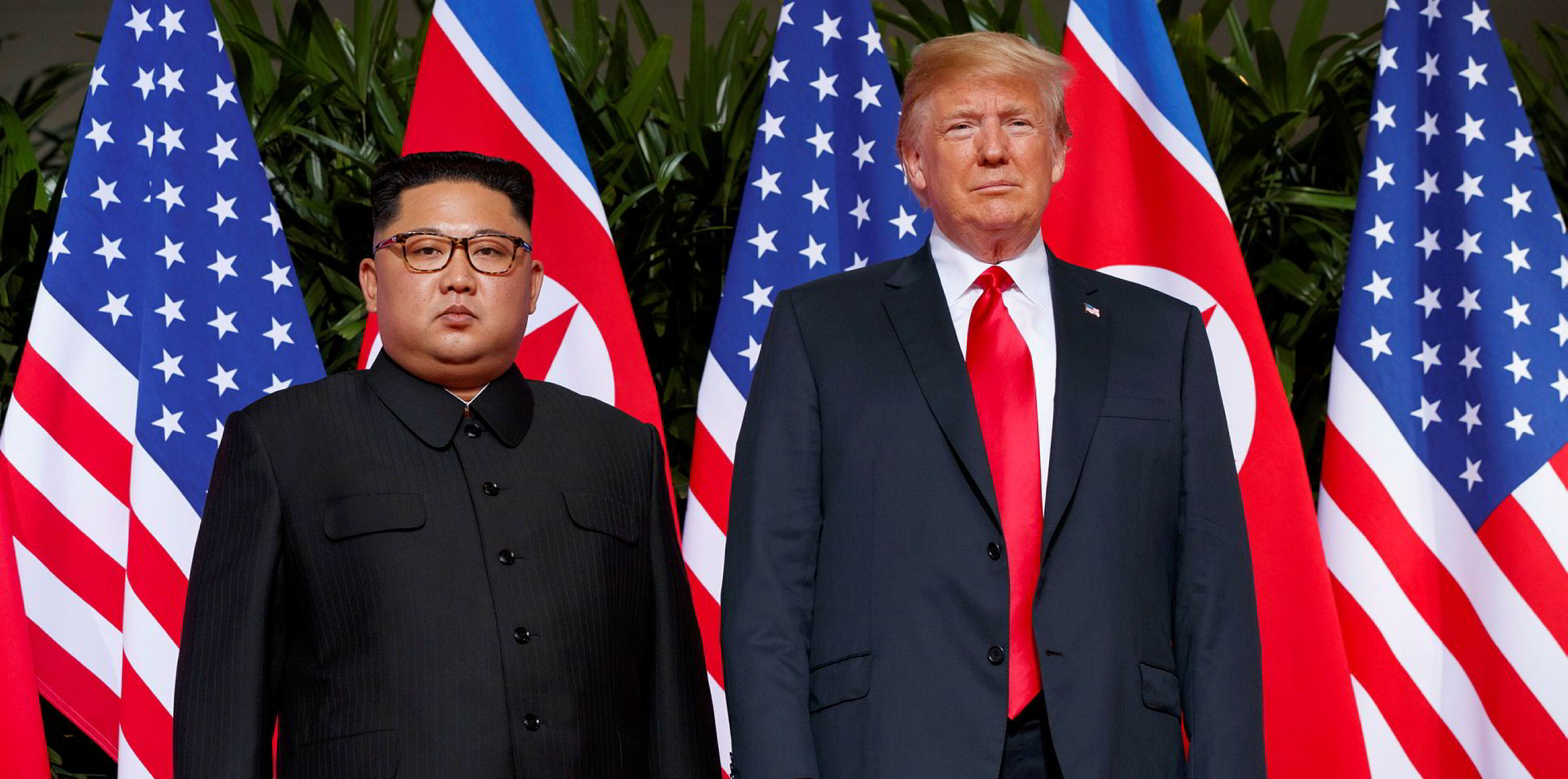The landmark summit between US President Donald Trump and North Korean leader Kim Jong Un this week is being hailed as a first step towards a denuclearised Korean Peninsula and perhaps the opening up of the so-called Hermit Kingdom to global trade.
Legal experts caution that for shipping, navigating a minefield of sanctions will remain difficult for the foreseeable future.
In Asia, the post-summit sentiment has been quite positive but tinged with scepticism.
It has not been forgotten that past US administrations have gone down a similar path with North Korea and always ended up in the same place.
But for now, people are willing to give the two leaders who took centre stage in Singapore on Tuesday the benefit of the doubt.
Esben Poulsson, chairman of the International Chamber of Shipping and president of the Singapore Shipping Association, summed up the mood expressed by several Asian shipping players polled by TradeWinds.
“Clearly, the Trump-Kim dialogue is much preferable to the state of tensions that have existed for a long time. But in terms of potential economic and trade opportunities, the devil will be in the detail and depend on the time frame on the lifting of sanctions,” he says.
“Overall, however, whether on a macro and micro level, a peaceful resolution of tensions on the Korean Peninsula can only be positive for Asia as a whole.’’
It remains to be seen how North Korea will contribute positively to shipping. China is about its only trading partner and, for now, coal its only export. But, with a population of more than 25 million, the country is an untapped market for many types of commodities.
“A thawing of relations with North Korea leading to the lifting of sanctions will have a positive impact on dry bulk,” Noble
Group head of chartering Michael Nagler says.
Eddie Huang, managing director of Singapore-based general cargoship player Glory Pacific, expects opportunities will be limited at first.
“If everything falls into place and North Korea is no longer under trade sanctions, I do believe there will be meaningful growth in trade, although the volume will likely not be significant given the economy is so small. The bulk of trade growth will likely go to South Korea and China, and much of it via land.
Niche players
“There remains ample opportunity for our niche [small bulkers and general cargoships] to benefit from steel and machinery, key imports needed to facilitate a build up of infrastructure, from Southern China, Japan and beyond.”
There are currently significant sanctions in place against North Korea that affect the shipping industry.
Most countries have implemented UN sanctions that prohibit exports and imports on a number of products, and severely restrict the chartering, operation or insurance of North Korean owned or controlled vessels.
The UN sanctions include, among other measures, bans on port entry and ship-to-ship transfers, and the detention of vessels complicit in sanctions evasion. These apply to insurers, flag registries, shipping companies and financial institutions.
The US has imposed additional secondary sanctions. These include ones on non-US persons that engage in importation and exportation of goods, as well as a “180-day rule” for vessels that have called at a North Korea port or are involved in ship-to-ship transfers.
Lawyers at the Singapore offices of law firm Reed Smith say the current US sanctions could be considered to be even more comprehensive than those imposed on Iran prior to the Joint Comprehensive Plan of Action in 2016.
“There is a limited amount of trade that Asian companies can currently engage in with North Korea and not be implicated by either the UN sanctions regulations or the US secondary sanctions.
“The main risk is that the easing or lifting of the sanctions may be temporary and any contracts entered into may become subject to sanctions,” Reed Smith explains.
Baldev Bhinder, a partner at law firm Joseph Tan Jude Benny, says that while sanctions have been in place for a long time, firms doing business with North Korea are constantly finding ways of getting around them.
“Coal continues to be one of North Korea’s major exports. It is probably sold to foreign countries using false origin documents and put on vessels with evolving identities and changing ownership structures to mask the links. Similarly, oil imports from ship-to-ship transfers on open seas are not unheard of.
“I think a bottom-line measure for companies is to review and study the ownership structures of vessels to make they are not inadvertently caught in these attempts to mask links caught by the sanctions regime.”
Bhinder expects that any form of modification to the sanctions will likely to be done in a piecemeal fashion over years and therefore companies should approach any North Korean business with caution.





